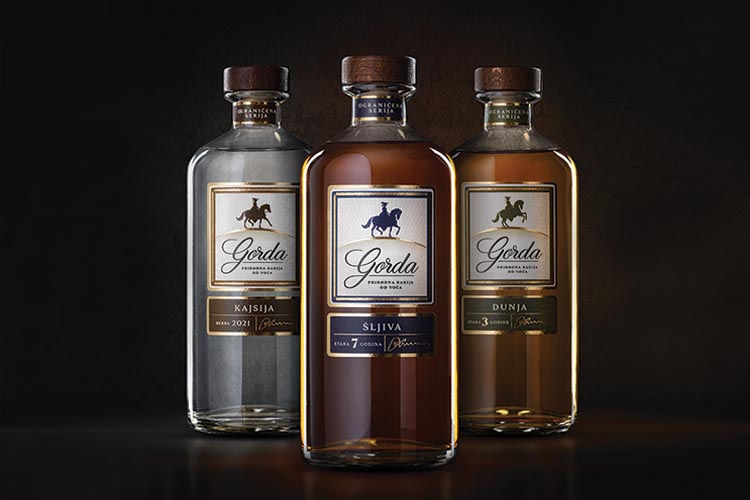A true avalanche has started in Serbia in the context of rakia production. The number of registered distilleries is constantly growing. Among the first, in this new sense, was Gorda, now a fully established rakia and nearly a synonym for this business activity.
In addition to plans to increase manufacturing in the family distillery, our interlocutor shares with us his hope that Serbia will one day, with state support, be branded as a country of topshelf fruit rakia. The potential is immense and beneficial in many ways, since our fruit rakias are a Serbian national brand, authentic and strong, but a lot of work is needed to make it globally recognisable.
How, why, and with what specific objective was Gorda created?
During the nineteen-nineties Veljko Škorić, my uncle, boldly and decisively laid the foundations of a different approach to rakia. After his death, my sisters established the Veljko i sinovi company and invited me to work together to preserve our heritage for all those coming of age and in memory of those no longer with us.

I am happy that Gorda today remains his, and that we have used these wings to continue dreaming and developing our portfolio.
For us, Gorda is not a rakia, it is an emotion preserved in a bottle. Our label shows an image of a woman called Gorda from the village Velereč on the slopes of mount Rudnik where, many years later, our distillery was created. For us, Gorda is love, heritage and our tradition. My uncle believed that it is possible to make top-quality slivovitz in Serbia, and that its price should correspond to the price of the finest French cognac. My desire, stemming from his vision, is to make Gorda a globally recognised brand, and to make Serbia the home of the highest quality fruit rakias.
In the increasingly diverse rakia market, it is very difficult to be special, different, and recognisable. What is the secret to your uniqueness? Is it the region, the manufacturing process, the quality of raw materials?
We comply with and meet all standards we have set for ourselves. Throughout the years we have perfected the manufacturing process in each of its segments, from raw materials to aging. The fact is that everything you listed is an integral part of the authentic mark of every product made in our cellar. The quality of fruit is an extremely important part of the manufacturing process, with part of our team dedicated to this one segment only.

The microlocale gives a specific note to every fruit rakia made. The processes of fermentation, distillation and aging, as integral parts of manufacturing, take the essence and boon of the fruit, giving the rakia its unique organoleptic mark, while our master blender provides the final creative touch through the coupage of such distillates.
During these winter months people gather with increased intensity, due to various family celebrations and collective holidays. Is there a better gift than a bottle of rakia of the highest quality?
We know that a bottle of Serbian rakia connects families and friends worldwide. Wishing to present our products in an even better way, we have recently also redesigned the packaging. We present our buyers with Gorda in a new dress, just as we will also hopefully surprise them with the novelties from our cellar.
A very real phenomenon in our market lately is that some foreign distillates, such as top-shelf whiskeys and cognacs, now see more than strong competition from rakia. How did this occur?
Our top-shelf rakias battle the finest ones from around the world on the local market. The development of the segment of fruit rakias during the past decade is an unexpected opportunity to compete in the grand slam of strong alcoholic beverages. One does not miss such an opportunity. This chance was mainly built through quality, and as such may place us on the global map in a different, more serious way. Of course, there is a lot of work before us.
The development of the segment of fruit rakias during the past decade is an unexpected opportunity to compete in the grand slam of strong alcoholic beverages
We have learned from the experiences of foreign alcoholic beverages and had the opportunity to see a lot about methods to communicate top-shelf products. Serbia has had and has a top-shelf product, but it does not have the budgets of large corporations for marketing and sales. Despite the fact that those that stand behind us, the producers, are small enterprises, Serbian rakia has found its path.
Since you have touched on the subject, tell us whether and to what extent does the state help make Serbian rakia a globally recognisable brand?
Certain steps forward can be seen during the past several years. An association of rakia producers has been established at the national level, and the Chamber of Commerce has also become involved through its initiatives. Giving wind to our sails, a month ago Serbian slivovitz was placed on the UNESCO List of Intangible Cultural Heritage. We believe the state will be more than open for well-elaborated proposals the moment it recognises its strategic interest in this.
Where I see room for additional cooperation is in a strategy to brand Serbia as a country of fruit rakia of the highest quality. The potential is immense and beneficial in many ways for all of us. Our fruit rakias are a Serbian national brand, authentic and strong, but a lot of work is needed to make it globally recognisable. I also see room in the additional regulation and control of the local market with the aim of eliminating the unregulated sale of rakias. We estimate the grey zone is five to seven times greater than the measurable sale of fruit rakias. We also see a serious risk for consumers in the sale of such rakias of uncontrolled quality.
We need greater support in promoting rakia. Data from last year is showing an export of around EUR 12 million. I believe that with appropriate cooperation and a different approach, in 10 years our exports could reach EUR 100 million. This certainly cannot be an individual task, but a well-designed strategy that should be supported by all of us. If France could do it with cognac, Mexico with tequila and mescal, Italy with grappa, Scotland and, lately, Japan with whiskey, why couldn’t Serbia do it with rakia? All the preconditions are there.
Gorda rakias are already being exported to a large number of countries, and they are winning awards nationally and worldwide. How proud are you of this?
The many awards we have won during the past decade are important as confirmation of being on the right track. We are happy to break out of the borders of the local market in every sense.
At this point it is questionable whether Gorda is a small family company, but it is certainly not a large corporation. Accordingly, what are the next steps in all areas?
We have placed most of our focus on increasing our raw materials base, as we are planning to make our sales abroad exceed local sales within five years. All our company strategies are set in this direction, with our agronomists and technologists representing our major cornerstones. Passion moves us on the wings of experience, but reason and dedicated work open new markets. We are aware that this is an enormous challenge, but our company can dream, because only by dreaming can we create and write a different tradition for Serbia.